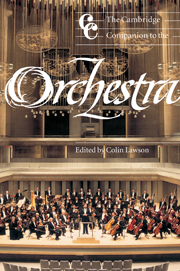Book contents
- Frontmatter
- 1 The history of the orchestra
- 2 The development of musical instruments: national trends and musical implications
- 3 The orchestral repertory
- 4 From notation to sound
- 5 The art of orchestration
- 6 The history of direction and conducting
- 7 International case studies
- 8 The revival of historical instruments
- 9 Recording the orchestra
- 10 Training the orchestral musician
- 11 The life of an orchestral musician
- 12 Historical recordings of orchestras
- 13 The orchestral composer
- 14 Educational programmes
- 15 The future of the orchestra
- Notes
- Appendices
13 - The orchestral composer
Published online by Cambridge University Press: 28 September 2011
- Frontmatter
- 1 The history of the orchestra
- 2 The development of musical instruments: national trends and musical implications
- 3 The orchestral repertory
- 4 From notation to sound
- 5 The art of orchestration
- 6 The history of direction and conducting
- 7 International case studies
- 8 The revival of historical instruments
- 9 Recording the orchestra
- 10 Training the orchestral musician
- 11 The life of an orchestral musician
- 12 Historical recordings of orchestras
- 13 The orchestral composer
- 14 Educational programmes
- 15 The future of the orchestra
- Notes
- Appendices
Summary
The composer and the orchestra today
‘Though the standard orchestra is not yet an anachronism, perhaps, it can no longer be used standardly except by anachronistic composers.’ Stravinsky's statement, made in the late 1950s, undoubtedly carries weight: first, from a historical angle and secondly, on account of the aesthetic/technical issues raised by such a succinct, yet perceptive, remark.
The purely musical is unavoidably bound up with practical, cultural and social issues whenever a composer writes an orchestral piece. If the creative spark has been kindled by a commission, the terms of the contract are usually clear, those who manage both chamber and symphony orchestras being primarily concerned with financial survival and, intertwined with such a concern, audience numbers. In short, money and ratings matter. As a result, outside the quasi-Utopian realm of public service broadcasting, an orchestra is a business whose very existence depends on pleasing the public, with all that this implies. Composers today cannot rely on the seriousness of mind displayed by Frederick the Great towards Bach (what contemporary monarch or arts administrator could set a composer a fugue subject?), nor can they expect the average listener to be versed in a particularly wide-ranging repertory at any level other than the most superficial. An orchestral concert is, historically, as well as by nature and intention, a public event, albeit the nature and scope of the ‘public’ having changed over the course of three centuries. There is no doubt that Haydn's late symphonies parade their virtues in a way in which his mature quartets do not; the brushstrokes are broader.
- Type
- Chapter
- Information
- The Cambridge Companion to the Orchestra , pp. 218 - 238Publisher: Cambridge University PressPrint publication year: 2003



